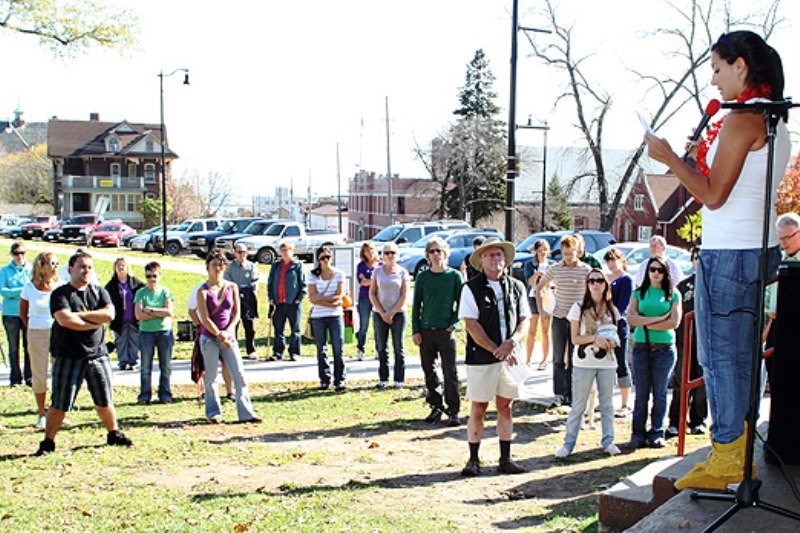Dr. Adam Cornwell is an optimist.
The assistant geography professor at Lakehead University said he has to think positive when working as a climatologist. Cornwell was one of the speakers who spoke to about 50 people at a rally in Waverly Park on Sunday in part of the world wide 10/10/10 Global Work Party.
The goal of the rally was to raise awareness about lowering the CO2 emissions in the atmosphere to 350 parts per million.
"Right now we’re past the target stated by this rally," Cornwell said. "The number 350 is significant because it has been set as a target for avoiding risks due to human cause. We’re past 350 parts per million of CO2 in the atmosphere, we’re at 380. To bring it down to 350 is going to be extremely difficult."
Cornwell said it would take a lot of work and a possible difficult transition for a fossil fuel dependent society. But there’re a few small steps residence can do to begin that change. Driving less, using energy efficient vehicles and appliances are some of the ways people can help to lower the CO2 emission, he said.
While those small changes are a good starting point, there still needs to be structural changes that discourage the use of fossil fuels, he said.
Elysia Petrone, student commissioner with Lakehead University Student Union, said it is the biggest climate change event in history and wanted to create more awareness about CO2 emissions.
"The number 350 is important because this is what climate experts have decided that this is the safe amount of parts per million of carbon monoxide in the atmosphere," Petrone said. "We’re just bringing awareness to that issue."
Graham Saunders, another keynote speaker at the rally, said evidence has already shown that climate change has affected the Earth.
"If we have those big changes we’d expect some impacts, we should have some visible evidence on what has changed," Saunders said. "We have quite a bit of that. The ice is melting in the Arctic, the migration of certain species are happening earlier and other movements such as deer and caribou shifting north. We have some evidence to some extent on what has happened already."
MP Bruce Hyer (NDP, Thunder Bay-Superior North) also spoke and gave an update on his Climate Change Accountability Act. The bill went through third reading in the House of Commons in May and has since moved to the senate for further debate.
Hyer said the bill is stuck in the senate controlled by Prime Minister Stephen Harper who is more interested in big oil than Canadian interests.
"The senate can tie up any bill they want simply by not debating it," Hyer said. "Harper has ordered his senators not to debate the climate change bill and let it just die in the senate."
The act would ensure that Canada contributes fully to reducing and stabilizing greenhouse gas concentrations in the atmosphere to 80 per cent lower than in 1990 by 2050.
Sign in or register
- Messages
- Post a Listing
- Your Listings
- Your Profile
- Your Subscriptions
- Your Likes
- Your Business
- Support Local News
- Payment History
Registered Users
Already have an account?
New Users
Create a free account.
